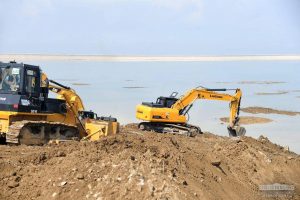In early May, a recently completed dam in Uzbekistan’s eastern region of Sirdaryo burst. Four people died and thousands were evacuated as water spilled across the region and into neighboring Kazakhstan. The Uzbek government vowed to investigate the dam’s failure, which given its recent completion — 2017 — is suspected to be rooted either in design or construction flaws.
Current President Shavkat Miriyoyev was prime minister during the dam’s construction.
Today, RFE/RL’s Uzbek Service reported about the connections between a wealthy Uzbek senator, Abdughani Sanginov, the president, and the dam project.
Sanginov, the report notes, is closely connected to the project:
Documents show that the contract to build the dam was put to a tender in 2010 by the UzSuvEnergo association, which reports to the Uzbek Water Resources Ministry.
But there appears to have been no public announcement to say that a lucrative contract was on offer to potential bidders.
Official documents say Sanginov was the head of UzSuvEnergo at the time.
He was in charge of the association from 2008 until 2017, when it was converted into a joint-stock company called UzbekHydroEnergo. Sanginov is now the chairman of UzbekHydroEnergo’s board.
The report goes on to outline that the contract was awarded to the Topalang Water Construction Company, which sources indicated was owned by Sanginov. RFE/RL is careful to note that the connection cannot be confirmed, but the allegation is worrying considering that Sanginov has been named to a special government commission responsible for investigating the dam’s collapse.
Although the RFE/RL report doesn’t use the term, the situation appears to be a classic example of a “conflict of interest.” If a company Sanginov owns, or has connections to, is potentially implicated in the dam’s collapse — and arguably any company involved in the construction falls into that category at this stage — his involvement in oversight or investigatory work of the collapse should be scrutinized. As summarized by an article on the topic in Fraud Magazine, “a conflict of interest exists when someone could abuse his or her official position for private gain.”
This is, in part, about perception. The existence of a conflict of interest isn’t in of itself corruption, it’s what happens after such a conflict arises that matters. If a conflict of interest exists when an individual could abuse their office, corruption exists when they do abuse their position for private gain.
If Sanginov has a financial connection to the construction of the dam, he shouldn’t be on the commission probing its collapse.
This is far from the first instance or example of a potential conflict of interest, ignored and possibly feeding corruption. Kristian Lasslett detailed serious concerns about conflicts of interests related to the Tashkent City development in the Uzbek capital in January 2019 for openDemocracy. Lasslett argues:
This is not only a matter of public integrity and fairness, as important as these virtues are. Investors, of the type President Mirziyoyev evidently wants to court, are not going to dip their foot in the economic waters of Uzbekistan unless they are confident there is a transparent and impartial public administration, led by those who are not sporting conflicts of interest, complemented by an independent judiciary with a track record of open and fair decision-making.
How the Uzbek government handles the investigation of the dam collapse matters, not just in the interest of getting to the bottom of the issue but as proof of progress on thorny issues like transparency and anticorruption. If Uzbek officials sweep the collapse under the rug, blaming severe storms and waves alone for the collapse, and don’t take efforts to demonstrate an impartial investigation concluding that fact (or impede journalists who will invariably attempt to investigate), Tashkent will be set back in its quest for a rebranding after an era marred by grand corruption scandals—an era during which the dam was constructed.

































